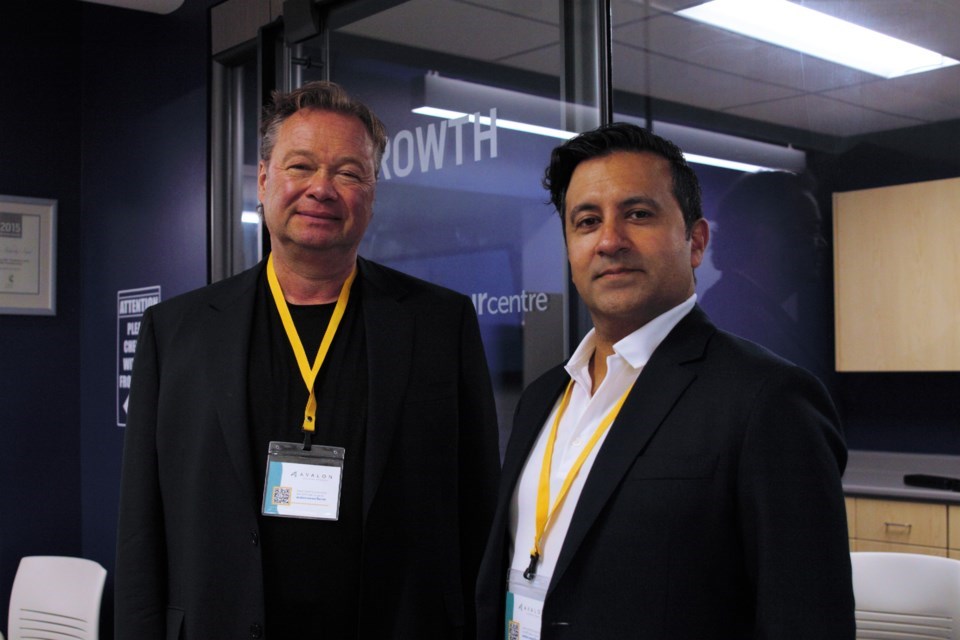The company behind a plan to build Ontario’s first lithium processing plant in Thunder Bay says it’s upsizing its aspirations, eyeing an industrial park that would also be home to a battery recycling facility and an innovation centre.
Leaders with Avalon Advanced Materials discussed the plans during a visit to Thunder Bay this week for the Central Canada Resource Expo.
President Zeeshan Syed called the visit a chance to “unveil Avalon and our plans for Thunder Bay,” while meeting with mining industry players, local politicians, and academic institutions.
The Toronto-based company announced in June it had acquired a former mill site on Strathcona Avenue for a lithium-hydroxide processing plant.
It says it hopes to have the plant in operation by 2027 or 2028.
In an interview Friday, Syed said the rising importance of the lithium industry in fuelling the transition to electric vehicles had inspired Avalon to eye ambitious plans for its role in that transition.
“Critical minerals have become a geopolitical issue, quite frankly, and it’s really elevated the importance of getting this right,” he said. “Avalon’s aspirations are not simply just to create our one processing facility, but to look for efficiencies in building that supply chain.”
That will include attracting partners interested in locating a lithium battery recycling facility on the Strathcona site, as well as founding a research and innovation centre that would, Syed said.
“We are in discussions with a host of other supply chain players from around the world — Europe, the U.S. — and they’ve taken an interest in our plans. So very quickly, we are in a position now to look at creating a technology and innovation hub on the site, in addition to our own processing facility.”
Avalon has estimated the plant, along with its flagship Separation Rapids lithium deposit in the Kenora area, will create around 500 jobs.
It’s a prospect municipal politicians have welcomed, calling the lithium industry a potentially crucial part of Thunder Bay’s economic future.
The company has called Thunder Bay an ideal location because of its proximity to the Separation Rapids deposit, its road and rail connections, and its deep-water port.
Avalon envisions the plant being utilized by other lithium producers, as well.
The company is planning the facility as a joint venture with one or two other partners, following a model similar to Separation Rapids, where it partnered with Belgium’s Sibelco.
“We view this as a domino effect — with Avalon’s regional facility there, there’s another place to send that material,” said Syed. “So we’re in talks with some of our colleague partners and producers in the region, and the feedstock strategy will change as we keep moving ahead.”
“It’s a very capital-intensive project. Not everyone is able or interested to build a billion-dollar project. So for them, having a partner like Avalon who’s developing that processing capacity makes tremendous sense.”
The company met with representatives of both Lakehead University and Confederation College during its visit.
Syed said the institutions will be key in supporting the proposed research and innovation centre, as well as building programs to help train future workers at the plant.
“It’s very important there’s a parallel track of making sure we’ve got the right skills in Thunder Bay – I know that’s been a focal point for the provincial and federal governments.”
Avalon CEO Scott Monteith, brought on in May, said the project will offer the opportunity for regional residents to build skills in an emerging field.
“It’s going to employ 500-plus people, we’re going to be training like crazy, because lithium processing is a whole new ballgame in Canada and the United States,” he said. “We’re going to not only train folks, but we’re going to innovate, we’re going to hopefully patent processes and other types of technology.”
“I think it’s going to be good for Thunder Bay — all of a sudden, Thunder Bay is going to be an attractive place to come and live for a lot of folks who don’t live in Thunder Bay right now. And I think the economic benefits are going to be tremendous.”
Monteith said Avalon’s plans have been welcomed by area leaders, but acknowledged concerns from some residents over the lithium industry’s environmental track record.
Pointing to his background in wastewater and stormwater management, Monteith said the company intends to address those worries head-on.
“Everyone’s receiving us well,” he said. “There are concerns — especially from people that know less about what we’re trying to do — regarding pollution, the water. Well, I come from water. I’ve protected the lakes, the rivers, the creeks, and the oceans for 30 years, and we’ll be doing the same thing at this site.”
Syed echoed that point, saying the public will have opportunities to learn more about the project.
“We’re invested in Thunder Bay. We bought this land, we’re part of the community, it’s our new favourite city in Ontario,” said Syed. “We want to make sure the public has every opportunity to hear from us.”
The company is expected to present to Thunder Bay’s city council at a public meeting next month.
Syed described a busy time ahead for the company, conducting feasibility studies at the Strathcona property, basic site preparation, and attracting interest from industry partners.
— TBnewswatch




